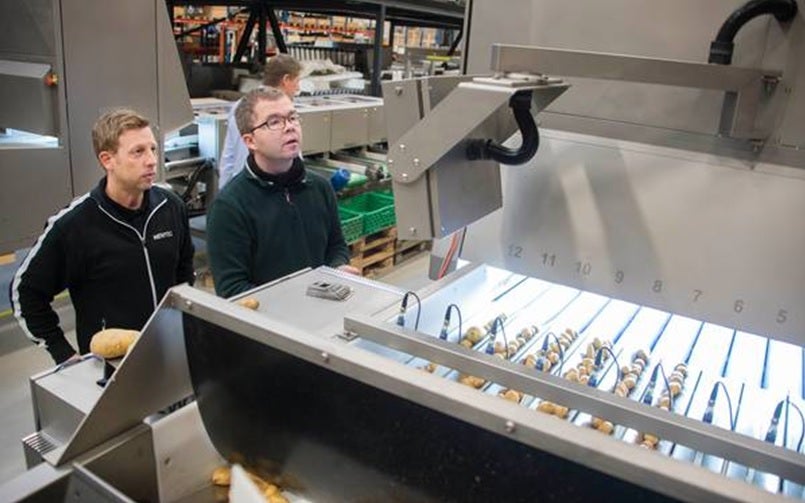
Using ultra-fast cameras, Newtec’s current solution can sort out the potatoes that have external injuries or diseases, while the potatoes are rolling at high-speed. Stock Photo: Peter Leth-Larsen.
The success company Newtec has received public support for high-tech development together with the Niels Bohr Institute.
Do you occasionally fear that the fruit or piece of chocolate that you are going to eat has been destroyed and made dangerous? In that case you are not alone. In Canada, hidden needles in potatoes from North America’s leading potato area, Prince Edwards Island, have for many years created great uncertainty among manufacturers, retailers and consumers. The industry has announced a bounty of half a million Canadian dollars for information that leads to the guilty party.
Nevertheless, the many cases have not been clarified, and this has caused the industry to contact the company Newtec, which produces most of the lines that sort potatoes. Customers want equipment that can not only find spots on the surface but can also look into the potato and discover needles and other problems.
“It is a very big wish from our customers, not least in that area. Both us and the others in the project have received a lot of inquiries from the Canadian industry. We have studied it thoroughly, but it is not possible to make the product we want with the current technology, so we have to develop something new from scratch,” says Bjarke Jørgensen.

Sorting, packing and weighing potatoes is Newtec’s largest area, so problems with needles in Canadian potatoes are a big topic for the company. Stock Photo: Peter Leth-Larsen.
Great support for research
He is head of research and development, in the Danish company, Newtec Engineering A/S, one of the world’s leading manufacturer in large-scale sorting plants that can study the quality of vegetables and fruits, but only on the visible surface.
A large grant of DKK9m from the Innovation Fund will allow Newtec, as well as a number of partners to develop a machine that uses X-ray photos to reveal whether there is any problem inside a food product.
The total budget is DKK17m, and the money is allocated to the development of new X-ray sources, new cameras and, not least, a completely new type of machine learning, sometimes called artificial intelligence, which is being developed at Niels Bohr Institute.
Newtec’s systems can find stains on potatoes and other vegetables at very high speeds, but an X-ray is something completely different, and here the well-known technology cannot find the sore points, so something new is required.
The needles in the potatoes or in chocolate are after all rare phenomena. It is a much more common problem that potatoes in some countries develop a cavity inside which reduces quality and usability. This condition, as well as a number of others, will also be revealed by the X-ray photo, and therefore the new machine is high on the priority list of Newtec’s customers.
“Our system must be able to find all internal problems. At the same time, the price will allow supermarkets to install a small version of their own to control their products,” says Bjarke Jørgensen, who expects to be able to sell the first machine in four years.
“We have examined the market, and although it is expensive technology, there seems to be good opportunities for selling the new equipment. We will also offer upgrading of existing plants,” says Newtec’s head of research and development.
Successful company
It is Newtec, which has initiated the research project, where Niels Bohr Institute’s knowledge of machine learning is a key part. The Odense company’s subsidiary Qtechnology in Copenhagen will develop cameras and Magnatek in Aarhus will develop a new type of X-ray sources.
The company, founded by Gunnar Petersen, and now owned by his family, is already very successful. This shows the Group’s recently published accounts, which tells about a year with an operating surplus of DKK51m, by far the best ever. Declining bond yields have, on the other hand, had an impact on the financial income, so the bottom line of the financial statements has been DKK7m lower than the year before.
The group has increased its staffing by seven, with an average of 105 employees. Equity in the family company amounts to a huge amount of DKK813m.

